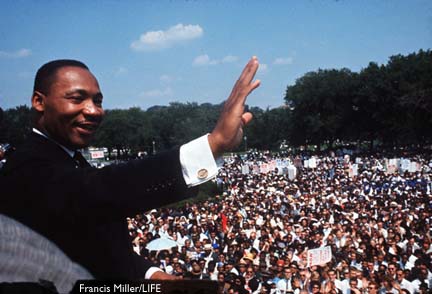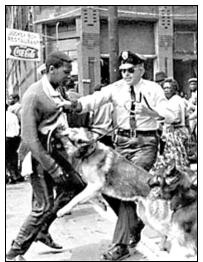|
|
|
|
|
|
|
|
|
|
|
|
|
Abstract

Even after his death, Martin Luther King Jr., a modern day martyr, remains a symbol of the African American struggle to gain civil rights.Through extraordinary leadership skills and dynamic speeches, King was able to instill confidence and a purpose into the fight for equality; no longer would African Americans be ignored.King’s efforts have placed him into an elite category of Americans whose influence has greatly contributed to changing our country for the better.
The mid 1900’s were a time of social unrest, with racism against African Americans rampant in the United States. This racism, which was most intense in the South, restricted the lives of African Americans in every fashion; an inability to vote, segregation, and pure hatred were just a few of the many factors which limited the lives of African Americans. The southern states, where slavery was lawful before the Emancipation Proclamation, were corrupt even in law enforcement. Torturing the lives of African Americans became almost a pastime for some dedicated confederate believers.
Organizations such as the National Association for the Advancement of
Colored People (NAACP) and the Southern Christian Leadership Conference
(SCLC) sought to promote equality. Often unsuccessful, and lacking
governmental support, these organizations had a difficult time curbing
racism. Until leaders like Martin Luther King, Jr. and white liberal
authority figures like John F. Kennedy came into prominence, racism was
difficult to avoid for African Americans.
Occasionally in life a person is born with the ability to change the world with their leadership, knowledge, and talents. Martin Luther King, Jr. was one such person. Born in Atlanta, Georgia on January 15, 1929 as grandson of Reverend A.D. Williams, a founder of Atlanta’s NAACP chapter, and son of Martin Luther King, Sr., also a civil rights leader, King was destined to serve the fight against racism. Important early in King’s life was religion; both his grandfather and father were pastors at Ebenezer Baptist Church in Atlanta. But because of his skeptical nature, King questioned the Church at a young age. It wasn’t until he entered Morehouse College in Atlanta at the age of fifteen that King began to accept the importance of religion. In his junior year at Morehouse King made the decision to serve society as a minister, becoming ordained and appointed assistant pastor to his father at Ebenezer Baptist Church on February 25, 1948.
Upon graduating from Morehouse College at the age of nineteen with a BA in sociology, King entered Crozer Theological Seminary in Chester, Pennsylvania. This institute allowed King to live in an integrated community where he could make white friends while strengthening his beliefs in integration. After graduating as a Bachelor of Divinity in June of 1951 King enrolled at Boston University, where he received a doctorate in systematic theology on June 5, 1955. Rather than take an academic teaching position, King went back to the South, where he accepted the pastorate at Dexter Avenue Baptist Church in Montgomery, Alabama. Shortly after this King got his first experience of the Civil Rights Movement.
On December 5, 1955 King was elected president of the Montgomery Improvement Association (MIA), just five days after Rosa Parks refused to obey Montgomery’s segregation laws. The struggle continued into 1956, eventually giving King national prominence because of his riveting speeches on pride and courage. Despite his house being bombed and a conviction on charges of interfering with the bus company’s operations, King preached his non-violent strategies. In fact, it seemed the more King was persecuted by white racists the more support he got from white liberals and other civil rights believers. Eventually the MIA’s approach worked, with the United States Supreme Court ruling bus segregation unconstitutional on November 13, 1956.
The success of the Montgomery bus boycott prompted King and other southern ministers eager to promote equality to form the Southern Christian Leadership Conference (SCLC). Voted president of this new organization, King preached to his followers the use of nonviolent strategies. Although this approach meant that blacks would suffer without attacking back, it allowed the errors of racist whites to come to national recognition. People across the country started to believe in and support the fight for freedom. King stressed the importance of nonviolence when he made his first national address during the Prayer Pilgrimage for Freedom. This speech, made at the Lincoln Memorial in 1957, emphasized how important it was for all blacks to receive voting rights. Soon after that in 1958 King published his first book, Stride Toward Freedom: The Montgomery Story, and toured India the year after, hoping to learn more about Gandhian non-violent strategies. King resigned from his position at Dexter Avenue Church at the end of 1959 so he could move to Atlanta and become assistant pastor to his father at Ebenezer Baptist Church.
While King did not organize mass protests in the early years of the Civil Rights Movement, a group of students known as the Student Nonviolent Coordinating Committee (SNCC) did. Keeping with King’s theory of nonviolence, the students organized sit-in protests in early 1960. King applauded the efforts of these young revolutionaries, but they weren’t so accepting of him. King received much criticism from some SNCC leaders eager to assert their independence in the movement. Even King’s participation in an October 1960 student sit-in in Atlanta didn’t relieve the tensions. “Freedom Rides,” started in 1961 to integrate southern transportation, further demonstrated the need to control the young activists. King also ran into conflict with the SNCC when both assisted in the Albany Movement during December 1961 and summer of 1962.
Birmingham, Alabama was among the most segregated cities in the United
States, known for it’s anti-black police force. It was here that
King turned to quell the differences between SCLC and SNCC. King
and the other protesters were beaten with fire hoses and police dogs, producing
newspaper headlines throughout the world. Sensing a need to stop
the brutality against blacks, President John F. Kennedy demonstrated his
support for the movement by submitting civil rights  legislation
to Congress in June 1963. Further protests for Civil Rights occurred
in cities across the country, culminating with the famous march to Washington,
D.C. that attracted more than 250,000 protestors. It was here, on
August 23, 1963, that King delivered his famous “I Have A Dream” speech
from the steps of the Lincoln Memorial. Congress eventually passed
the Civil Rights Act in 1964.
legislation
to Congress in June 1963. Further protests for Civil Rights occurred
in cities across the country, culminating with the famous march to Washington,
D.C. that attracted more than 250,000 protestors. It was here, on
August 23, 1963, that King delivered his famous “I Have A Dream” speech
from the steps of the Lincoln Memorial. Congress eventually passed
the Civil Rights Act in 1964.
King’s fame grew in 1964 as he was named Time magazine’s Man of the Year and received the Nobel Peace Prize. These great accomplishments were not enough to stop criticisms from “Black Power” advocators such as Malcolm X and Stokely Carmichael, whose ideas of black nationalism and self-defense appealed to northern blacks more than King’s moderate policies. Despite these inter-movement conflicts, King and his followers were able to organize the march from Selma to Montgomery, which led to the passing of the Voting Rights Act in 1965. Shortly after this King was assaulted in the Chicago area while trying to spread his nonviolent policies. However, this opposition was not enough to stop King from implementing his techniques in the Poor People’s Campaign of 1968, which sought to eradicate black economic problems.
A division amongst the revolutionaries was not the only thing hindering King’s effectiveness. FBI direct J. Edgar Hoover sought to undermine his power when King openly criticized American intervention in the Vietnam War. Also, King’s support from white liberals was at a low point when he was assassinated by James Earl Ray on April 4, 1968, while assisting a sanitation workers strike in Memphis. Today, King epitomizes the struggle for black Civil Rights, and his legacy will live on as one of the most influential Americans of all time.
The impact Martin Luther King, Jr. had on our country is difficult to describe in words. Born in Atlanta, King saw and experience firsthand the immense segregation between blacks and whites. After graduating with a doctorate in theology from Boston Universtiy, a great accomplishment for a black man at this time, King turned his efforts towards the Civil Rights Movement. With the help of organizations such as the SCLC and the SNCC, King was able to influence the passing of both the Civil Rights Act and the Voting Rights Act. Although his work was not yet finished before his untimely death, King laid the groundwork for equality in our country. He will forever be remembered as the father of one of the greatest movements in our nation's history.
Bennet, Jr., Lerone. What Manner of Man. Chicago: Johnson Publishing
Company, 1968.
Carson, Clayborne. The Autobiography of Martin Luther King, Jr.
New York: Warner Books, Inc., 1998.
Faircloth, Adam. Martin Luther King, Jr. Athens: Thomson-Shore,
Inc., 1995.
Harmer, Harry. Martin Luther King, Jr. Gloucestershire: Sutton
Publishing, Inc., 1998.
McKnight, Gerald. The Last Crusade. Boulder: Westview Press,
1998.
http://tlc.ai.org/mlk.htm A collection of articles and papers written about Martin Luther King, Jr., including a timeline of significant events in his life.
http://www.martinlutherking.org A thorough historical examination of Martin Luther King, Jr.
http://www.lib.lsu.edu/hum/mlk/ An informative website containing pictures, a timeline of historical events, and references to other Martin Luther King, Jr. websites.
http://lifemag.com/Life/mlk Numerous pictures taken during the life of Martin Luther King, Jr.
http://seattletimes.nwsource.com/mlk/man/photogallery An archive of pictures taken of Martin Luther King, Jr.